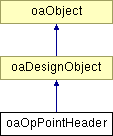 |
 |
 |
||||||
Inheritance diagram for oaOpPointHeader:

 |
 |
Public Methods | |
| oaBoolean | isBound () const |
| oaOpPoint * | getOpPoint () const |
| void | getOpPointName (oaString &name) const |
| void | getAnalysisLibName (oaString &name) const |
| oaCollection< oaAnalysisOpPoint, oaOpPointHeader > | getAnalysisOpPoints () const |
Static Public Methods | |
| oaOpPointHeader * | find (const oaDesign *design, const oaString &analysisLibName, const oaString &opPointName) |
Public Types | |
| enum | { dtIndex = oacOpPointHeaderDataType } |
| enum | { domain = oacNoDomain } |
The oaOpPointHeader class can be observed by deriving from oaObserver<oaOpPointHeader>.
|
||||||||||||||||
|
This function searches the specified design for an opPointHeader with the specified analysisLibName and opPointName. |
|
|
This function gets the name of the analysisLib. |
|
|
This function returns a collection of analysisOpPoints in this opPointHeader. |
|
|
This function attempts to return the opPoint associated with this opPointHeader. If the opPointHeader is bound, a pointer to the opPoint is returned. Otherwise, NULL is returned. |
|
|
This function gets the name of the oaOpPoint that is bound to the design. |
|
|
This function returns a boolean value that indicates if this opPointHeader is bound. |
|
|
|
|
|
|

Copyright © 2002 - 2010 Cadence Design Systems, Inc.
All Rights Reserved.